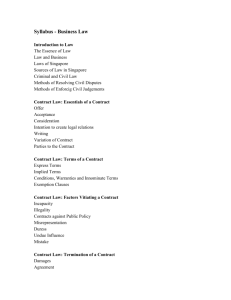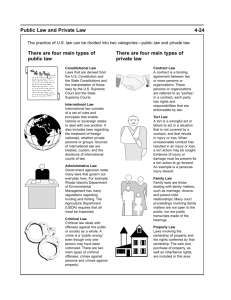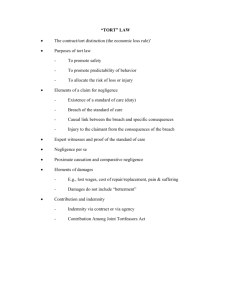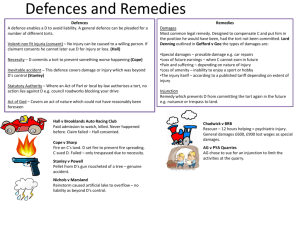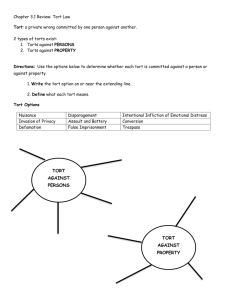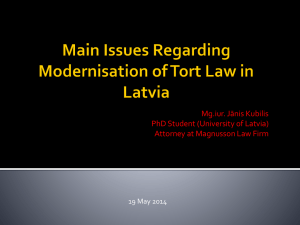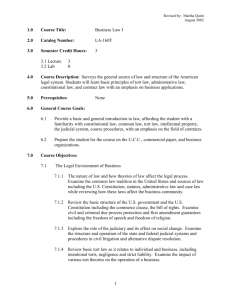Torts: A Civil Wrong
advertisement
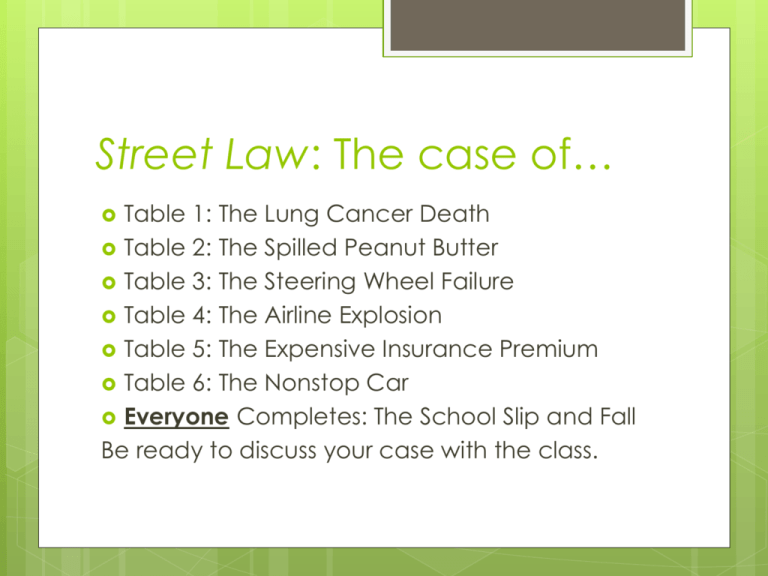
Street Law: The case of… Table 1: The Lung Cancer Death Table 2: The Spilled Peanut Butter Table 3: The Steering Wheel Failure Table 4: The Airline Explosion Table 5: The Expensive Insurance Premium Table 6: The Nonstop Car Everyone Completes: The School Slip and Fall Be ready to discuss your case with the class. Torts: A Civil Wrong Ms. Weigl What is a tort? When law. a person commits a wrong in civil Quick Review Plaintiff Judgment Defendant damages Strict liability Applies when a defendant is engaged in an activity so dangerous that there is a serious risk of harm even if he or she acts with the utmost care. 1. Owners of dangerous animals 2. People who engage in highly dangerous activities 3. Manufacturers and sellers of defective consumer products Liability Tort law deals with these basic questions (1) who should be liable or responsible for harm caused by human activities (2) how much should the responsible person have to pay Important Terms remedy something to make up for the harm done liability legal responsibility for harm settlement agreement reached by both parties common law law made by judges through court decisions, generally in state appellate courts: basis of tort law Important Terms intentional wrong An action done with the intent of injuring a person, his or her property, or both. negligence Most common tort. Occurs when a person’s failure to use reasonable care causes harm. Important Terms Civil law Deals with disputes between individuals or groups of individuals Standard of Proof The level of certainty and the degree of evidence necessary to establish proof in a civil or criminal proceeding Important Terms Preponderance of the evidence Usually a standard of proof used in a civil suit; the burden of proof that a party must meet in order to win the lawsuit Deep pockets A description of the person or organization, among many possible defendants, best able to pay damages and therefore most likely to be sued in a tort case Important Terms Minor A child; a person under the legal age of adulthood; usually 18 or 21. Waive To give up some right, privilege, or benefit voluntarily Immune Exempt from penalties, payments, or legal requirements; free from prosecution Important Terms Class action A lawsuit brought by one or more persons on behalf of a larger group Contingency fee The fee paid to an attorney based on the percentage of the sum the client is awarded or settles for in a lawsuit Important Term Liability insurance The type of coverage or insurance that pays for injuries to the other people or damage to property if the individual insured is responsible for an accident during the term of the contract Important Term premiums Payments made for insurance coverage deductible The amount an insured person agrees to pay toward repairs before the insurance company pays anything. Important Terms Malpractice Failure to meet acceptable standards of practice in any professional or official position. Medical coverage Insurance which covers an individual’s own medical expenses resulting from accidents Collision coverage Insurance that pays for damage to the insured’s own car caused by an automobile collision Important Terms Comprehensive coverage The portion of an insurance policy that protects an individual against automobile damages or losses other than collisions. Uninsured motorist coverage Insurance that protects drivers from those with no insurance or inadequate insurance. No-fault insurance A form of automobile insurance or accident insurance (available in only a few states) in which each person’s insurance company pays up to a certain share of damages, regardless of fault. Exclusive remedy The only solution, or compensation, available to a plaintiff in a particular legal situation Application Sixteen-year-old Carrie is babysitting for her four-year-old niece Jill. Carrie leaves Jill alone in the living room and goes into the kitchen to use the phone to call her boyfriend. From the kitchen she can hear but not see Jill. While Carrie is out of the living room, Jill falls off of a chair and is hurt. Application Ben, a defensive tackle on the high school football team, tackles a teammate in a full-contact practice. When the teammate hits the ground, his shoulder is dislocated. Application Mr. Ghosh owns a large apartment building. When his janitors wax the lobby floor, they place a 12-inch-square sign near the front door that reads: “Caution. Wet Floors.” Mrs. Gonzalez is hurrying home from shopping with two large bags of groceries. She does not see the sign and slips and falls on the freshly waxed floor, injuring her knee and arm. Application Corina leaves a sharp knife on the kitchen table after making a sandwich. A threeyear-old neighbor, who has been invited over to play with Corina’s daughter, climbs up onto a chair, grabs a knife, and seriously cuts his finger. Application Jamal, a school bus driver, has a heart attack one morning while driving the bus carrying students to school. As Jamal loses consciousness, the bus slams into a wall, injuring several students. One month earlier during a routine check up, Jamal’s doctor had warned him of his heart condition. Application Matt and Emily are sitting in the upper deck of the stadium behind first base at a major league baseball game. A foul ball hit by their team’s star player bounces off a nearby railing, smacking Matt in the head and giving him a concussion. Application Jess, an expert auto mechanic, continues to drive her car even though she knows that the brake linings are badly worn. Driving below the speed limit on a rain slick road at night, she slams on the breaks and skids into a bicyclist who is riding one foot away from the right curb. Tort or No Tort? Determine whether a tort has been committed in each situation. If there is a tort: is it intentional? is it an act of negligence? is it an activity for which strict liability should be imposed? Tort or No Tort? Jose trips over his untied shoelace while running to catch a bus, breaking an ankle. Tort or No Tort? Mr. Slifko buys a strong painkiller at the drugstore and takes the capsules according to the directions on the package. He has an extremely bad reaction to the drug and has be taken to the hospital. Tort or No tort? Chen drinks too much alcohol at the office holiday party. His super visor, Ruth, advises him to take a taxi home, but he thinks he will be okay if he drives slowly. Not noticing a stop sign, he strikes and kills a pedestrian crossing the street. Insurance? You have an eight-year-old car with a market value of only $4,000. The annual cost of collision insurance, should you continue to purchase it? Give your reasons. Should you carry liability insurance? Explain.

